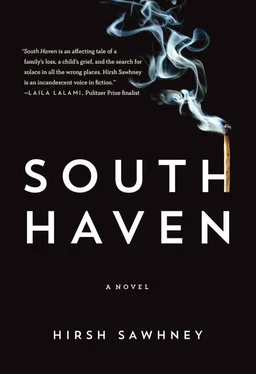“Like what?”
“Depressed.”
“He’s not depressed, Arjun. He’s just focusing on his book.”
Arjun stopped at another light. He glanced at Siddharth and smiled. “Don’t be so serious all the time. What’s wrong?”
“Nothing.” Then, after a long pause, he said, “Well, lots of things.”
“Name one.”
Siddharth chewed a chunk of skin from the inside of his mouth. “I don’t know. Money.”
“We already talked about that. I thought that was all settled.”
“Yeah, but Rachel, she spends way too much money.”
“What?”
“She’s always buying such pointless stuff — shampoo and makeup. And she makes Dad spend his money on stupid things. His suit — it cost, like, a thousand dollars. And the new shoes? They were at least a hundred bucks.”
Arjun wove the car through the congested thoroughfare. “That doesn’t sound like him. Dad’s too cheap to spend that kind of money on shoes.”
“Yeah, well, things change. You don’t know the real Ms. Farber, Arjun. All she cares about is money. That’s why she got divorced in the first place.”
“She has her own money,” said Arjun, smoke trickling out of his nostrils. “It’s not really your place to judge.”
“You don’t get it. Why do you think she’s sticking around?”
Arjun took a hard drag off his cigarette and then chucked it out the window. “Why?”
“I bet she wants the life insurance money.”
Arjun cracked a smile, then slapped Siddharth on the knee. “Sometimes I forget.”
“Forget what?”
“That you’re just a kid.” He pulled into a gas station, parking beside a beat-up tow truck. “Siddharth, you really need to try to be more honest with yourself. Otherwise you’re gonna end up like Dad.”
Arjun stepped out of the car, leaving Siddharth sitting there stewing. His brother was just as big of a pain as his father.
* * *
In the morning, when Siddharth walked to the bathroom to pee and brush his teeth, he spotted their luggage at the end of the hallway — Ms. Farber’s black suitcase and the rolling duffel she had given Mohan Lal for Hanukkah. A bag containing Mohan Lal’s new suit was draped over the luggage. They’ll be gone soon, he thought. Thank God.
When he got to the kitchen, Ms. Farber was at the table clipping coupons while Mohan Lal cracked eggs at the counter. Mohan Lal was wearing a sleeveless wool sweater and a tucked-in button-down shirt. Siddharth was pleased to see him so crisp. His father seemed alert for a change, strong in a way that he hadn’t in months.
Mohan Lal told him they would be leaving before noon and then offered him an omelet.
“Sure,” said Siddharth, who headed toward the guest room. Arjun wasn’t there, and his bed was already made. Siddharth dashed back to the kitchen, where Ms. Farber explained that his brother had gone for a jog.
“But it’s freezing out,” said Siddharth.
“It’s forty-eight degrees,” she said. “You boys should take note and follow suit.”
You should shut the fuck up, thought Siddharth. He poured himself a glass of orange juice and moved toward the family room, but Mohan Lal told him to wait.
“What?” said Siddharth.
“Today we shall have a family breakfast.”
Siddharth contemplated saying a couple of things — that he didn’t like breakfast, and not everyone here was actual family — but he seated himself in the kitchen, staring down at the newspaper Arjun had bought from the gas station. An advertisement announced a special offer on a tour of Mallorca, which he assumed was in Mexico.
Ms. Farber offered Siddharth a bowl of fruit from the fridge, and he spooned the mixture into a quarter plate. He noticed that it contained bananas. His mother had always said that bananas were a big mistake in a fruit salad. They turned all the other fruit brown.
Ms. Farber brought her planner to the table and flipped through its pages. “Lots to do this morning, I better hurry.”
“There’s plenty of time,” said Mohan Lal. “Spend five minutes with the mirror, not fifty.”
“Really, Mo?” said Mr. Farber. “Now?”
Siddharth heard the front door open, and moments later, Arjun walked into the kitchen sweating and panting. Before greeting anyone, he downed two glasses of water.
“Arjun,” said Mohan Lal, “what kind of omelet will you have?”
“I’ll just have fruit,” said Arjun. He seated himself beside Siddharth and ate some grapes and bananas directly from the bowl. Mohan Lal placed a steaming omelet in front of him. Siddharth knew this one had been intended for him but chose not to say anything.
“I read your little article,” said Mohan Lal.
“Great,” said Arjun, shaking salt over his eggs.
“You don’t want my opinion?”
“I have an idea,” said Arjun. “Why don’t you write one of your little letters to the editor?”
“I want cheese in mine,” said Siddharth. “And no onions.” He turned the page and found the article in question: “Shattered Dreams of Democracy” by Arup Sengupta.
Ms. Farber tore out a check. “Honey, what did we say about the cheese?”
Mohan Lal beat some more eggs, and soon they were sizzling on the stove. “This professor of yours — I know his type. He’s nothing but a lefty — a leftist Muslim-lover. Such people only write half the truth.”
“Thanks for the input, Dad. Can I get some toast?”
“Let your professor have his opinions,” said Mohan Lal. “My only problem is that he has converted my son.”
Arjun slammed down his glass, and Siddharth jumped in his seat. “If I remember correctly,” said Arjun, “weren’t some of your best friends Muslims?”
“What rubbish are you speaking?” said Mohan Lal, placing an omelet in front of Siddharth.
“Mahmood?” said Arjun. “Shamim?”
“Those were your mother’s friends.”
“Bullshit. You went on vacation with them. You let them babysit your son.”
“I have no recollection of those events.”
“That’s worrying,” said Arjun. “I hope you’re not going senile.”
Ms. Farber peered at them over the rims of her reading glasses. “Guys, you know what my mother used to say? She said there’s no point in hurting someone you love over politics.”
“That’s the problem with this country,” said Arjun. “Everyone is so damn apolitical. That’s why our government can do whatever it wants, wherever it wants.”
Siddharth said, “If you hate America so much, then why don’t you go to India — or maybe Pakistan?”
Ignoring Siddharth, Arjun glared at Mohan Lal, who turned off the exhaust fan and brought an especially large omelet to the table. He gave a third of it to Ms. Farber and saved the rest for himself.
“Listen, son,” said Mohan Lal. “You don’t know what I saw — what I lived through. If you did, you’d be singing a different song.”
“How could I know? You’ve repressed it all. You can’t even remember what actually happened.”
Ms. Farber put away her planner and let her reading glasses dangle around her neck. “I’m always telling you the same thing, Mo.” She scrutinized her omelet. “Are those hot peppers?”
“Coriander,” said Mohan Lal, seating himself beside her. “Listen, your professor is crying about crimes against Muslims, but what about the Mussulman? Haven’t they raped? Haven’t they murdered?”
“This is different,” said Arjun, his fingers twisting the bristles of his beard.
“Different? You’re telling me a murder isn’t a murder? What strange leftist notions you’ve acquired at college.”
“Dad, when a government inflicts violence on a specific group of people — for no apparent reason — they have a name for it in the civilized world. They call it genocide. Rachel, can’t you talk any sense into him?”
Читать дальше












